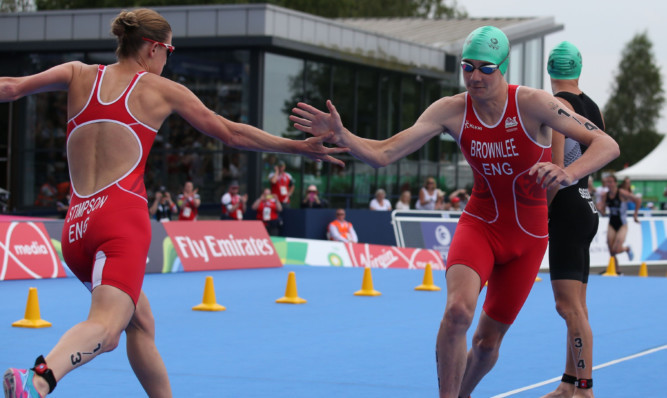
Triathletes add to their legion of armchair fans.
I was fortunate enough to see nine different events at the London Olympics in 2012, eight of which were sports I was watching live for the very first time.
The one which really stayed with me, and something I’ve been to see again in the aftermath, was triathlon. I’m not alone. Triathlon is the fastest growing sport in the UK and Britons made up two of the top four in both the men and women’s world triathlon series in 2013.
It can be an unusual event, and the only sport I can think of where an ability to get undressed quickly is a key component of the race, but those moments where it resembles a round in the Generation Game quickly give way to admiration for the incredible endurance of the competitors.
At the women’s event in Hyde Park in 2012, Sweden’s Lisa Norden failed to win gold because, after swimming for 30 minutes, cycling for an hour and running for 40 minutes, she failed to time her dip for the line properly in a sprint finish with the Swiss Nicola Spirig.
The ebb and flow of a race where athletes who are poor swimmers can make up time if they’re good cyclists or runners, and vice versa, makes for an exciting spectator event although I take issue with BBC presenter Sonali Shah’s analysis that “many of the spectators here and the people watching us back home will be doing a triathlon in their spare time this weekend.” I’m fine watching other people doing it in my armchair, thanks, and I’m sure most of the fantastic crowd cheering on the athletes in Strathclyde Country Park are with me on that.
Not resting on their laurels, the authorities have come up with a new format to thrill the non-participants, the mixed relay event consisting of four “supersprint” triathlons, which made its Commonwealth Games bow on Saturday.
With the main rivals to the English team of Jonny and Alistair Brownlee, Vicky Holland and Jodie Stimpson being either Spanish or injured the only thing that could stop them from winning gold was a collective round of neck ache from wearing their Olympic, World Championship and Commonwealth medals.
All four had won medals in their individual event 48 hours before (two golds, a silver and a bronze), which commentator Annie Emmerson concluded “makes it very difficult for the other teams.”
If you were thinking that swimming, cycling and running for two hours on Thursday would make them tired, Annie had news for us.
“The problem for the athletes is that they are used to racing over two hours so it takes them a while to get warmed up.” This meant that by the end of the 250 metre swim, eight kilometre bike ride and one mile run they’d be “raring to go.”
If we needed any more confirmation that these were human beings cut from a different cloth, New Zealand’s Nicky Samuels runs with a permanent smile on her face
After the first three members of the England team had built up a handy lead, Alistair Brownlee was a little too raring to get going as he set off on the final leg and the BBC cameras caught his foot over the start line.
“Are we about to get notice of a 15 second penalty?” asked Matt Chilton, suddenly thinking we might have a race on our hands.
“It’s a family trait,” chirped in Steve Trew, referring to a similar penalty that hit younger brother Jonny in the Olympics (he still won bronze).
On this occasion, Alistair escaped punishment and was allowed to walk over the line, grinning broadly, high-fiving the spectators and collecting flags in the same way he had done in the men’s individual race on Thursday.
“He’s barely broken sweat,” said Chilton.
I was exhausted sitting in the armchair at the end of the hour and 15 minutes on such a hot day but Alistair really did look raring to go.

Enjoy the convenience of having The Sunday Post delivered as a digital ePaper straight to your smartphone, tablet or computer.
Subscribe for only £5.49 a month and enjoy all the benefits of the printed paper as a digital replica.
Subscribe